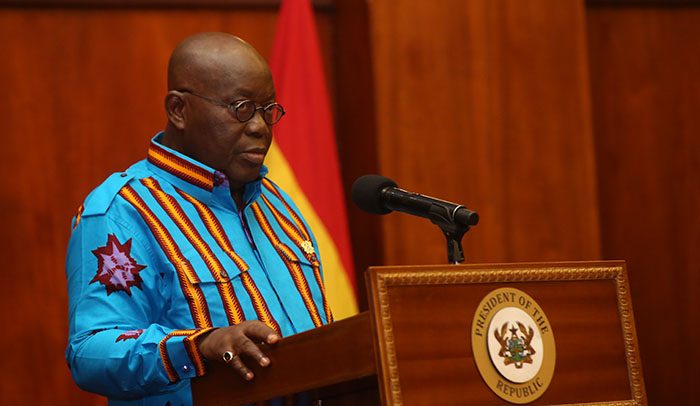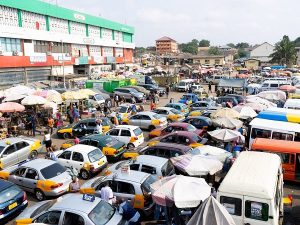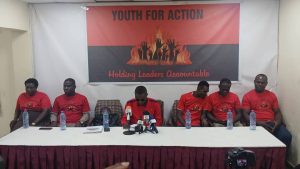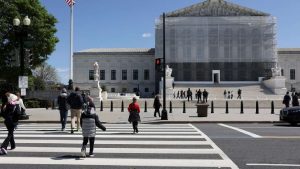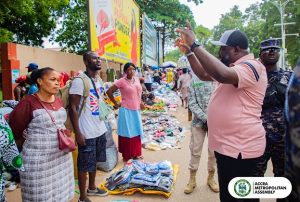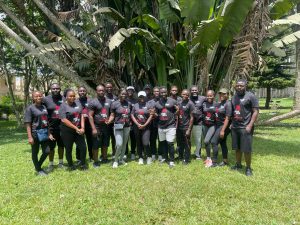I thank you for welcoming me into your homes for the sixteenth (16th) time, as the fight to defeat COVID-19 continues not only in Ghana, but across the world. Day-in-day-out, countries, including our own, institute measures to try to limit and contain the spread of the virus, and return lives to normalcy. Some of these measures have been successful, others have not worked, with some countries now experiencing hikes in infection rates, and the emergence of what is referred to as a ‘second wave’ of the virus.
With the effectiveness of Government policies, the co-operation of you, the Ghanaian people, and by the grace of God, our nation has been relatively spared such unwelcome developments. Indeed, since 31st May, when Government decided to embark on a strategic, controlled, progressive, and safe easing of restrictions in the country, so as to get our lives and economy back to normal in safety, we have continued to witness low hospitalisation and low death rates.
The number of active cases continues to be on the decline. At the time of my last address, two weeks ago, the total number of active cases, that is persons currently with the virus, stood at one thousand, eight hundred and forty-seven (1,847) persons. As at Friday, 28th August, the number of active cases has reduced to one thousand, and fifty-nine (1,059) persons. A total of forty-two thousand, nine hundred and sixty-three (42,963) persons have recovered, and two hundred and seventy-six (276) persons, a great majority of them with underlying illnesses, such as hypertension, diabetes and chronic liver disease, have sadly died.
In as much as these statistics are encouraging, in contrast to what is pertaining in several countries across the world, we cannot afford to let our guard down. We have to maintain, in a state of constant readiness, the enhanced infrastructure and expertise we have built during the period of the virus to cope with it. I have been reliably informed that, in some regions of our country where there are no active cases, some residents are abandoning, altogether, the protocols, such as the wearing of masks, put in place to defeat the virus. Indeed, the high compliance rate with mask wearing of persons surveyed by the Ghana Health Service in some selected areas of Accra, to which I referred optimistically in my last address, has, according to a new survey by the same Service, fallen alarmingly. This is not acceptable, as the enhanced hygiene, mask wearing and social distancing protocols must now be central features of our lives, and they must continue to remain so for some time to come, until we see to the elimination of the virus from our country.
Let me remind those amongst us, who want to continue to disregard these protocols, that severe sanctions exist in our laws for such persons, who will want to endanger the rest of the population through their actions and negligence. The law enforcement agencies will, where necessary, apply these measures without fear or favour, ill-will or malice, and without recourse to a person’s ethnicity, gender or religion.
Fellow Ghanaians, in Update No.15, I announced the easing of restrictions in some areas of national life. I also indicated my hope that preparations and simulation exercises underway, including the installation of COVID-19 testing facilities at Kotoka International Airport, would give us a clear indication as to whether or not we could re-open the airport on 1st September. After weeks of thorough work, I am satisfied that it is safe to do so.
Fellow Ghanaians, I am glad to announce that Kotoka International Airport will reopen and resume operations from Tuesday, 1st September 2020. This decision has been communicated to international airlines.
It has been well-established that the very first cases of COVID-19 in Ghana were imported into our shores. We are determined to make sure this scenario does not recur. The commitment to ensuring that the gradual easing of restrictions, including the reopening of our airports, does not lead to the importation or resurgence of the virus into our country, is firmly in place. That is why the following measures have been taken and duly communicated to airlines wishing to resume flights to Ghana:
1. any passenger arriving in Ghana must be in possession of a negative COVID-19 PCR test result from an accredited laboratory in the country of origin. The test should have been done not more than seventy-two (72) hours before the scheduled departure from the country of origin. All airlines have been instructed to ensure compliance with this directive for all passengers wishing to travel to Ghana, and those airlines who fail in this regard will be duly sanctioned;
2. disembarking passengers must do so wearing face masks;
3. upon disembarking from the aeroplane, each passenger will undergo a mandatory COVID-19 test at the airport terminal, at a fee to be borne by the passenger. The test result will be available within thirty (30) minutes;
4. children under the ages of five (5) will not be required to undergo testing at the airport;
5. passengers, who test positive for COVID-19, will be handled by the health authorities for further clinical assessment and management; and
6. passengers, who test negative, can, thereupon, enter Ghana to go about their lawful activities, and will be advised to continue to observe COVID-19 safety precautions during their stay in Ghana.
The Ministries of Information, Health and Aviation, and their respective agencies – the Ghana Health Service, the Ghana Airports Co. Ltd., and the Ghana Civil Aviation Authority – will spell out in further detail the protocols surrounding the re-opening of our international airport, and the procedures to be adhered to by passengers arriving in Ghana at the COVID-19 media briefing tomorrow, Monday, 31st August. For the avoidance of doubt, our borders, by land and sea, will continue to remain closed to human traffic until further notice.
Fellow Ghanaians, I will now address the question of the re-opening of our schools. With continuing students in the University of Cape Coast, the University of Health and Allied Sciences, Technical Universities, and some other Colleges returning to school almost a week ago, to finish their academic year, the decision has been taken by the Ghana Education Service, after consultation with the relevant stakeholders, for SHS 2 and JHS 2 students to return to school from 5th October to 14th December 2020 to complete their academic year.
With Junior High Schools operating with class sizes of thirty (30), and Senior High Schools with class sizes of twenty-five (25), SHS 2 and JHS 2 students will be in school for ten (10) weeks to study, and write their end of term examinations. SHS 2 students in boarding houses are to return to their various dormitories on 5th October, whilst day students, respecting fully the COVID-19 protocols, will commute from home to their respective schools on the same date. Prior to reopening, all Junior and Senior High Schools will be fumigated and disinfected. Just as was done in the case of final year university, JHS and SHS students, all JHS 2 and SHS 2 students, as well as all teaching and non-teaching staff, will be given reusable face masks. Each school will be provided with Veronica Buckets, gallons of liquid soap, rolls of tissue paper, thermometer guns, and 200 milli-litre containers of sanitizers. JHS 2 students will be given one hot meal a day.
Assemblies and sporting events remain banned; and the use by outsiders of school premises for other activities is still not allowed. We will continue to ensure that each school, which does not have its own sick bay, has been mapped to a health facility, and care is provided to the sick by nurses assigned to them.
The Ghana Education Service, after further consultations, has decided to postpone the remainder of the academic year for all nursery, kindergarten, primary, JHS 1 and SHS 1 students. The next academic year will resume in January 2021, with appropriate adjustments made to the curriculum, to ensure that nothing is lost from the previous year. The relevant dispositions will also be made so that the presence, at the same time, in school of all streams of students, can occur in safety.
I appreciate fully the inconvenience and the financial burden the continued stay at home of children are posing to parents and guardians. Fellow Ghanaians, these are a necessary price to pay in our efforts to protect the lives of our children, as well as to limit and contain the spread of the virus in our country.
In the next couple of weeks, a decision will also be taken on the resumption of contact sports, including football, taking into consideration the imminent participation of our national teams in international competitions. As a known lover of football, I know how devastating its absence has been, and it is my hope that very soon we will all have the pleasure of playing and watching the beautiful game again. Until then, non-contact sports are the only sporting events permitted to take place. Beaches, pubs, cinemas and nightclubs are still to remain closed until further notice. All other institutions that have been cleared to function are to continue to do so in strict adherence to the COVID-19 protocols.
Fellow Ghanaians, the difficulties imposed on our everyday lives, and the impact COVID-19 has had on our livelihoods, must serve as sufficient motivation for us all to continue to adhere to the enhanced hygiene, mask wearing and social distancing protocols that must characterise our daily routines in this country. The more we adhere, the sooner we defeat the virus, and return to our normal way of life. I am confident that this can be soon. This challenge is not insurmountable. We can do it. We have it in us to surmount any challenge if we put our hearts and minds to it. Whilst at it, let us continue to pray to Almighty God to keep a benevolent eye on us, and keep us from harm.
This too shall pass! For the Battle is the Lords.
May God bless us all, and our homeland Ghana, and make her great and strong.
I thank you for your attention, and have a good night.

